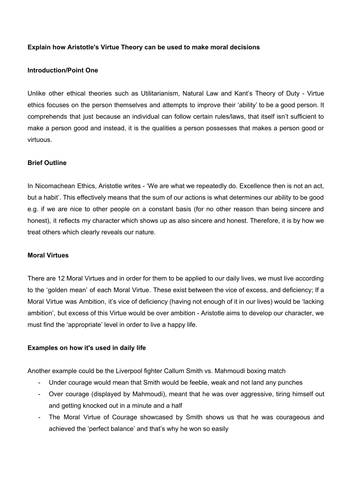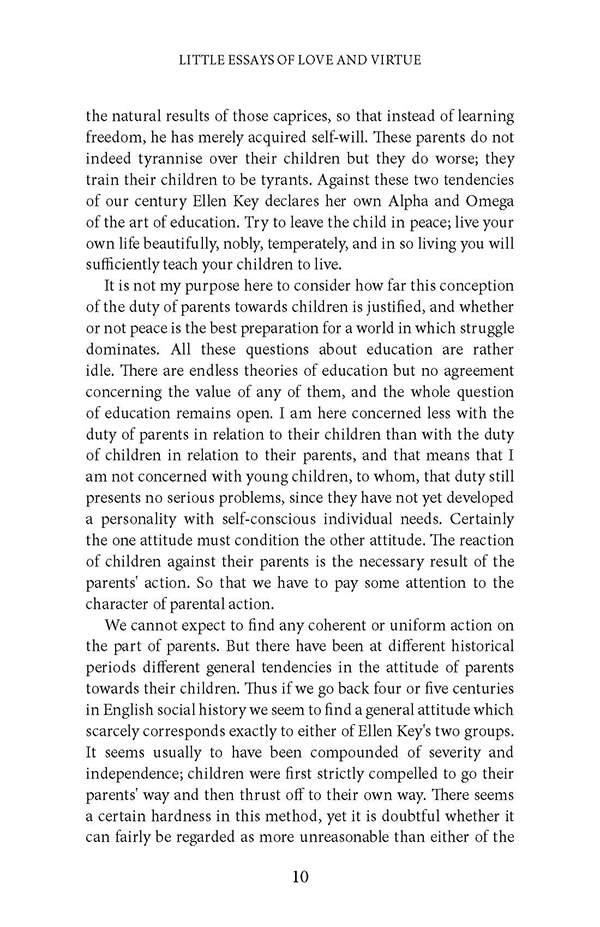
Virtue And Virtue Ethics
· Virtue is a broad term used in ethics, it identifies with the moral character of a person where some other ethic theories focus on duties and roles or the consequences of an action. Virtue ethics has been broken down into three main theories: eudaimonism, agent-based theories, and the ethics of care. Eudaimonism is based on human flourishing or a Virtue is the habit of doing moral good. It is also the habit of abstaining from doing moral evil. In this way virtue is an indication of good character. According to Aristotle, “Virtue is a permanent state of mind, formed with the concurrence of the will and based upon an ideal of what is best in actual life, an ideal fixed by reason.”Estimated Reading Time: 8 mins Virtue Ethics Virtue-based vs. duty-based ethics: arguments and examples from Victor Hugo, Aristotle, Bernard Mayo, Nathaniel Hawthorne, and William Frankena In the study of ethics and morality, there have been theoretical foundations in which it was argued that morality comes with being rather than doing, or that a true moral life is one that is a product of doing instead of being

�� Simple & Easy Virtue Essay Titles
· Best Virtue Topic Ideas & Essay Examples The Virtue of Moving Forward in “A Rose for Emily” by William Faulkner The misery of those who are unable to accept the reality and to get free from the influence of the past is the main theme of William Faulkner’s short story “A Rose for Emily”, where [ ] Montesquieu Practice of Virtue in Ancient Republic · Virtue is a broad term used in ethics, it identifies with the moral character of a person where some other ethic theories focus on duties and roles or the consequences of an action. Virtue ethics has been broken down into three main theories: eudaimonism, agent-based theories, and the ethics of care. Eudaimonism is based on human flourishing or a Virtue Ethics Virtue-based vs. duty-based ethics: arguments and examples from Victor Hugo, Aristotle, Bernard Mayo, Nathaniel Hawthorne, and William Frankena In the study of ethics and morality, there have been theoretical foundations in which it was argued that morality comes with being rather than doing, or that a true moral life is one that is a product of doing instead of being

Essay topics
Virtue Ethics Virtue-based vs. duty-based ethics: arguments and examples from Victor Hugo, Aristotle, Bernard Mayo, Nathaniel Hawthorne, and William Frankena In the study of ethics and morality, there have been theoretical foundations in which it was argued that morality comes with being rather than doing, or that a true moral life is one that is a product of doing instead of being Virtue is the key to a meaningful and happy life. According to ancient philosophers, Socrates and Aristotle, developing virtue is vital in order to lead a successful, fulfilling life. Though both men differ in their interpretations of a "good life," they both agree that the supreme life is one of virtuous meaning Virtue is the habit of doing moral good. It is also the habit of abstaining from doing moral evil. In this way virtue is an indication of good character. According to Aristotle, “Virtue is a permanent state of mind, formed with the concurrence of the will and based upon an ideal of what is best in actual life, an ideal fixed by reason.”Estimated Reading Time: 8 mins

�� Best Virtue Topic Ideas & Essay Examples
This page contains the best examples of essays on Virtue. Before writing your essay, you can explore essay examples - note their structure, content, writing style, etc. The process of creating an essay about Virtue generally consists of the following steps: understanding the assignment, identifying the topic, collecting information, organizing the information collected, developing the · Virtue is a broad term used in ethics, it identifies with the moral character of a person where some other ethic theories focus on duties and roles or the consequences of an action. Virtue ethics has been broken down into three main theories: eudaimonism, agent-based theories, and the ethics of care. Eudaimonism is based on human flourishing or a · In this essay I will critically discuss Aristotle’s concept of virtue. I will illustrate how he was influenced by his predecessors and how he disagreed with them and developed his own philosophy. I will also describe how he defined the concept of virtue – what virtuous traits are and also how to be a virtuous person

Essay examples
Virtue Ethics Virtue-based vs. duty-based ethics: arguments and examples from Victor Hugo, Aristotle, Bernard Mayo, Nathaniel Hawthorne, and William Frankena In the study of ethics and morality, there have been theoretical foundations in which it was argued that morality comes with being rather than doing, or that a true moral life is one that is a product of doing instead of being · Virtue is a broad term used in ethics, it identifies with the moral character of a person where some other ethic theories focus on duties and roles or the consequences of an action. Virtue ethics has been broken down into three main theories: eudaimonism, agent-based theories, and the ethics of care. Eudaimonism is based on human flourishing or a Virtue is the habit of doing moral good. It is also the habit of abstaining from doing moral evil. In this way virtue is an indication of good character. According to Aristotle, “Virtue is a permanent state of mind, formed with the concurrence of the will and based upon an ideal of what is best in actual life, an ideal fixed by reason.”Estimated Reading Time: 8 mins
No comments:
Post a Comment